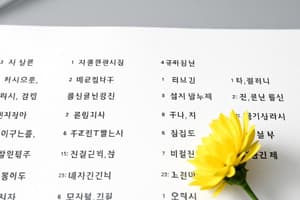Podcast
Questions and Answers
' ' \U0001F4AA ?
' ' \U0001F4AA ?
- (correct)
' ' ?
' ' ?
- TV (correct)
?
' ( ) .'
? ' ( ) .'
- (correct)
- ?
( ) ?
: ?
: ( ) .
( ) ? : ? : ( ) .
( ) ?
( ) .
( ) ? ( ) .
?
**** .
? **** .
Flashcards
신청하다
신청하다
Applying and submitting a formal request.
신청서
신청서
A written request or application form.
문의하다
문의하다
To ask, usually requiring a formal request.
이해하다
이해하다
Signup and view all the flashcards
변하다
변하다
Signup and view all the flashcards
잊어버리다
잊어버리다
Signup and view all the flashcards
인사와 소개
인사와 소개
Signup and view all the flashcards
여행과 경험
여행과 경험
Signup and view all the flashcards
쇼핑과 생활
쇼핑과 생활
Signup and view all the flashcards
초대와 방문
초대와 방문
Signup and view all the flashcards
집안일
집안일
Signup and view all the flashcards
성격과 외모
성격과 외모
Signup and view all the flashcards
생활 습관
생활 습관
Signup and view all the flashcards
공연과 감상
공연과 감상
Signup and view all the flashcards
한국 생활
한국 생활
Signup and view all the flashcards
예절과 질서
예절과 질서
Signup and view all the flashcards
기분과 감정
기분과 감정
Signup and view all the flashcards
맛과 음식
맛과 음식
Signup and view all the flashcards
학교생활
학교생활
Signup and view all the flashcards
감사와 선물
감사와 선물
Signup and view all the flashcards
Study Notes
- These notes cover vocabulary and grammar from the Korean textbook "Sungkyun Korean 2".
- The listed topics are for level 2 Korean language learners.
인사와 소개 (Greetings and Introductions)
- Grammar includes N(이)라고 하다 (to be called), V+(으)ㄴ 적이 있다/없다 (have/have not had the experience of), V+고 있다 (be doing), and V+(으)ㄹ까 하다 (planning to do).
- Vocabulary includes terms for application forms, names, nationalities, and personal information.
- 어휘 also covers professions such as teachers (교사, 강사, 교수), farmer (농부), and entrepreneur(사업가).
- Other vocab includes, SNS , birthplace, traditions, and Korean traditional clothing (한복).
- Descriptors such as a bit, calling(부르다), class(수업), joke (농담)
- 이력 사항 = career information
- 학교명 = school name
- 전공 = major
여행과 경험 (Travel and Experience)
- Grammar points include N(으)로 (with/by means of), V/A+았/었/였으면 좋겠다 (I wish/hope), N+와/과 (and), and ㅎ irregular verbs.
- Vocabulary relates to travel such as transportation (교통편), accomodation(숙소), and itineraries (일정).
- It covers tourist activities (야경, 불꽃놀이), souvenirs (기념품), and festivals (축제).
- Describes destinations as unique (유명하다), impressive(인상적이다), or exotic( 이국적이다).
- Includes phrases like "입에 맞다/안 맞다" (to suit one's taste/not to suit one's taste) and "고생하다" (to have difficulties).
- Other terms include 기억에 남다 (to remain in one's memory), last time (지난번), staff(사원), and experience (경험).
쇼핑과 계획 (Shopping and Plans)
- Grammar includes N보다 (than), V+아/어/여 주세요 (please do), N 때문에, V/A+기 때문에 (because of), and V+아도/어도/여도 되다 (it's okay to).
- Shopping related vocabulary such as being comfortable(편하다), inconvenience (불편하다), price (가격), and efficiency(성능).
- Descriptors such as diverse (다양하다), bright( 밝다), and dark(어둡다).
- Vocabs also describe services as holidays (휴일), volume(양이 많다), and stores such as marts(마트).
- Discusses product satisfaction (마음에 들다, 만족하다).
초대와 방문 (Invitations and Visits)
- V+기로 하다 (to decide to do), N+에게/한테/께 (to), V/A+(으)니까 (because), and V/A+(으)ㄹ까요? (shall we?).
- Vocabulary related to celebrations (입학식, 졸업식, 결혼식) and welcoming events (환영회, 송별회).
- Describes occasions like housewarming parties (집들이) and baby's first birthday parties (돌잔치).
- Contains verbs such as forget(잊어버리다), visit (방문하다), congratulate(축하하다), and invite(초대하다).
- Other vocab covers gifts and practice (연습하다).
집안일 (Household Chores)
- V+다가 (while doing), V+(으)ㄴ/는/(으)ㄹ (future tense modifier), V/A+(으)ㄹ 때 (when), and V+(으)ㄹ게요 (I will).
- Terms related to tidying up (정리하다), cleaning (청소기), and washing laundry (빨래).
- More Vocab like dusting (먼지를 털다), washing (닦다), and doing ironing (다림질).
- Common verbs include 맡기다(entrust), 찾다(find), and 다니나(attend).
- Some Descriptors include average (평균), each(각자), and fully( 충분하다) relating to tasks.
성격과 외모 (Personality and Appearance)
- A+(으)ㄴ (adjective modifier), V/A+(으)ㅁ (noun ending), A+(으)ㄹ/(으)ㄴ 것 같다 (seems like), and N+처럼 (like).
- Character traits like 급하다(impatient), 느긋하다(relaxed), 털털하다(easy-going), and 꼼꼼하다(meticulous).
- More descriptors such as 외면(appearance), 내면(inner) and 외향적이다(extroverted).
- Includes vocabulary such as family(형제), brother(동생), sister(누나).
생활 습관 (Lifestyle Habits)
- Grammar points include V+(으)려면 (if one intends to), V+게 되다 (to become), N+마다 (every), and V+(으)면 안 되다 (should not).
- Adverbs such as 꾸준히,(consistently), regularly (규칙적으로), and always(항상).
- Bad Habits - 덜다 = shake
- Vocabulary covers setting alarms (알람), physical fitness (생활), and new terminology.
공연과 감상 (Performances and Appreciation)
- Grammar covers V+자마자, V+(으)ㄴ/는/(으)ㄹ 것 같다, V/A+지요?, and V/A+(으)ㄴ/는지 알다/모르다.
- Vocab includes terminology for plays, musicals, and concerts.
- 관객 (audience) and especially special guest (특별)
- Descriptive words for feelings (감정)
- 설레다 = excitement
한국 생활 (Korean Life)
- Grammar V+(으)ㄴ지 describes length of time and how long, 르 불규칙 describes irregular verbs, and A+게 describes how something different occurs
- Descriptors include strange (낯설다), topic (주제), and fluid (유창하다)
- Vocab to describe being used to some thing (익숙하다)
- Other useful vocab include 거리(street) and 다음(next)
예절과 질서 (Manners and Order)
- Grammar V+는 게 좋겠다 expresses opinion, recommendation, or advice, and is often translated “should/would” do or be.
- More grammar such as "it would be nice" [V+(으)ㄹ 테니까], "please" [V+(으)십시오), and reason [V+기 위해서 ]
- Useful vocabulary such as etiquette and order (예절 & 질서), behavior ( 행동), and culture (문화) and society (사회)
- Also useful vocabulary to describe order such as disordering. Examples include 새치기를 하다 (disorder) and 규칙 (rule).
- Verbs include 짖다 describes to shout.
기분과 감정 (Feelings and Emotions)
- Grammar and vocab to desribe feelings and emotions
- Common descriptors include excited (설레다). proud (뿌듯하다), or comfortable (편안하다).
- Ways to describe feelings like 위로 (comfort one another) and 상 (awards or rewards)
- Other terminology to describe working hard or congratulating (합격하다)
맛과 음식 (Taste and Food)
- Grammar V/A+(으)ㄴ/는는데요 describes a light question to a proceeding statement
- 식당 vocab (restaurant).
- How to describe taste. 느끼하다 or 담백하다
Studying That Suits You
Use AI to generate personalized quizzes and flashcards to suit your learning preferences.




